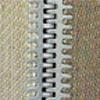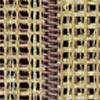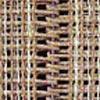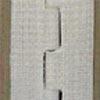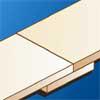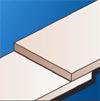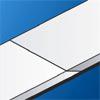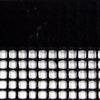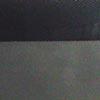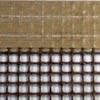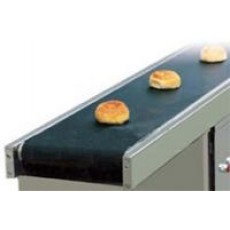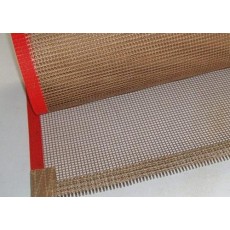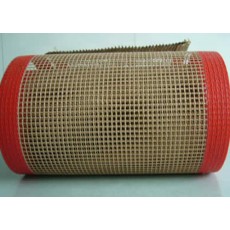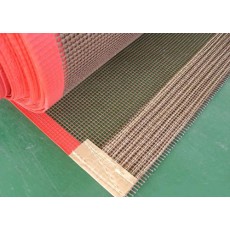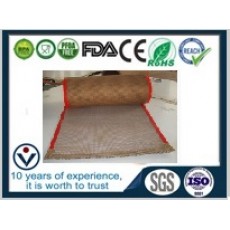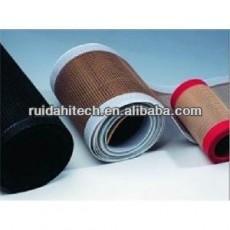High temprature resistance non-sticky screen printing ink drying belt ptfe teflon coated fiberglass mesh sides zipped

- ← Pizza belt Dryer belt PTFE teflon fiberglass conveyor belt with kevla border
- PTFE fiberglass fabric conveyor belt for carpet →
Product Description
Ruida produced ptfe fabric mesh belt,drying oven belt,screen printing Ink drying,UV dryers. Welcome you purchase our standard products or send us your OEM requests.
Product Details
Quick Details
|
Place of Origin: Jiangsu, China (Mainland) |
Brand Name: Ruida fiberglass fabric |
Model Number: RD9013-RD9045 |
|
|
Weight: 165-780 |
Width: 1250-3500mm |
|
Yarn Type: E-Glass |
Weave Type: Plain Woven |
Alkali Content: Alkali Free |
|
Standing Temperature: -140-260℃ |
|
|
Specifications
conveyor belt
1.Manufacturer.
2, Super non-sticky character, high temperature resistance.
3.Rohs certified.
PTFE Belting
Ruida manufactures various of belts with its material of smooth ptfe fabric,ptfe mesh, kevla, silicon rubber etc to custom specifications, depending on each customer’s individual needs. To help determine the best belt for your unique application, you need provide the following information for our experienced technical manager to discuss your requirement.
Ordering Your Ruida Belt
Whenever possible, have the following information available:
* Dimensions of belt: width and length
* Desired splice, edge reinforcement and tracking devices, where needed
* Pulley size and type
* Any special construction or instructions concerning the fabrication of your Ruida belt. In some cases of
complex fabrication,a print may be requested.
Choosing the Right Material
There are a number of factors to keep in mind when choosing the belting material for your application:
* Temperature Range – Our ptfe fabrics have the capabilities of withstanding -70°C- +260°C constant operating temperatures.
* Pliability – If the material is to track around pulleys that drive the belt, the diameter of the pulley is critical. The smaller the roller the more flexible the belt must be. Ruida’s thinner materials (0.010” and under) are more pliant than the heavier coated fabrics.
* Release Qualities – The surface finishes of our materials range from a rough, semi-porous finish to a super smooth surface. The release or fabric impression results desired will be a determining factor.
* Strength – Options to be considered are breaking, tensile and tear strength. How much of a load the belt carries, how fast it moves and how tightly it will be tensioned all must be considered.
Fabric Grades
Learn more about the various fabric grades available when constructing your belt.
Applications
Learn about the different applications for ptfe coated fiberglass ,silicon coated glass tapes, fabrics and belts.
Fabrication Options
Learn more about the many options available for constructing your Ruida conveyor belt.
|
Metallic Splices |
|
|
|
Alligator Splice
|
|
|
Clipper Splice
|
|
Non-Metallic Splices |
|
|
|
Peek Splice
|
|
|
Smartloop Splice
|
|
|
Fabric Notch Splice
|
|
Endless Splices |
|
|
|
Butt Splice
|
|
|
Overlap Splice
|
|
|
Scarfed Splice
|
Edge Reinforcements
RUIDA belts can be supplied with strips of heat-sealed film or fabric on one or both edges of your belt. This reinforcement serves a dual purpose; it reduces fraying of belt edges which rub on guiding rollers and it also provides the strongest possible anchor for guiding pins, snaps and grommets.
|
|
TFE-Film Edge, Heat-Sealed surface. The TFE film is available in 3 mil, black or clear, or 10 mil tan (1" surface only). |
|
|
Fabric Edge, Heat-Sealed
|
|
|
Fabric Edge, Sewn & Sealed
|
Two-Ply Belts
Two-ply belts are constructed of two plies of TFE-GLASS™, laminated together with staggered splices. This provides a smooth, continuous thickness along the entire belt length which guarantees a uniform seal in packaging and heat-sealing applications. The belts are typically available in widths of ½" – 3".






